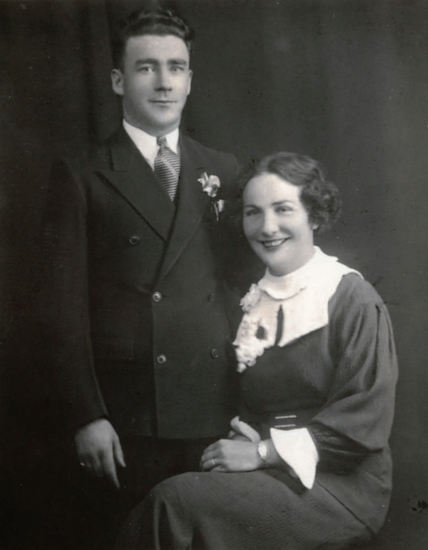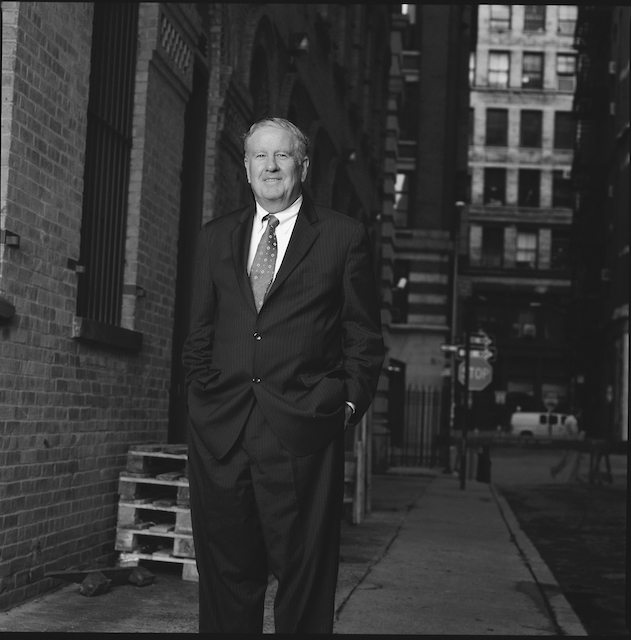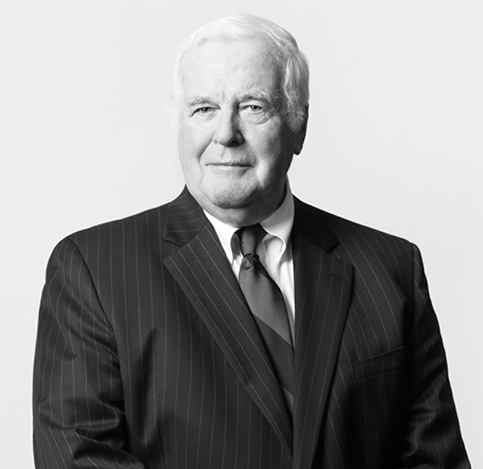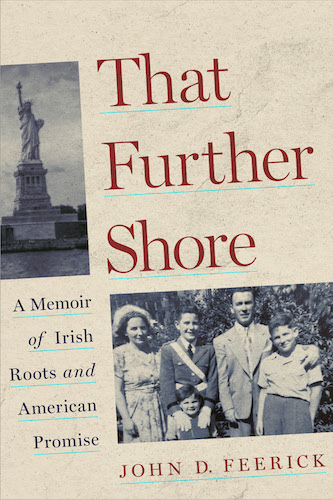John D. Feerick’s rise, from child of Irish immigrants to the hallowed halls of Fordham Law School, is covered in his new book, reviewed here by Stephen Fearon.
It is often remarked that although the overwhelming majority of Irish immigrants to America in the early 20th century were literate and fluent in the English language, very few of them recorded their life stories in diaries or other autobiographical writings.
Letters home to parents and relatives were abundant and usually full of cheerful news of new jobs, marriages, babies etc. but without much interest to historians. One might reasonably suspect that for many of these immigrants their memories of the land left behind were often too painful to warrant being memorialized in diaries and other writings.
Their life stories were often left to be told by their sons and daughters and this new book by John D. Feerick, Dean Emeritus of Fordham Law School, is a long and detailed love song to his parents, John and Mary Jane Boyle Feerick, both from the County Mayo, who came separately to New York in the late 1920s where they met, married and settled in the Bronx, a few blocks from Yankee Stadium.

There are two central themes in the book. The first is the story of John and Mary Jane and their four children, of whom the author was the eldest. The second is the story of Dean Feerick’s extraordinary career in the law.
The six Feericks lived in a two bedroom apartment on East 161 Street and Morris Ave. It was a household where there was no excess of material goods or cash, but everyone had the essentials of life including loving parents and an opportunity for higher education provided one studied hard and had part-time or summer jobs to help with tuition.
The Hibernian and Catholic atmospheres were pervasive with frequent parties featuring John Sr. on the accordion and Mary Jane showing some dance steps learned in Mayo.
John attended Saint Angela Merici grammar school on East 163rd Street (still there) and Bishop Dubois high school (closed in 1976) and then Fordham College and Law School graduating from the latter in 1961.

Feerick’s interest in Ireland began shortly after the death of his father in 1988 when he made his first trip to Mayo and met many of the Feerick and Boyle relatives. Those trips became an annual event with research in a variety of graveyards, rectories, government offices etc. all in pursuit of family genealogies and all of it to piece together the life stories of his parents and his own (unexpressed) determination to find out precisely where he came from.
Feerick obviously fell in love with Ireland and its people and in ensuing years was the driving force, at the invitation of the late John Hume, in establishing a summer program for Fordham Law students to study issues of Dispute Resolution in Belfast and Dublin, a program that continues to this day.
After high school the author went directly to Fordham College and then Fordham Law School where he was Editor-in-Chief of the Law Journal. He then joined the Skadden Arps law firm as an associate; the firm consisted then of 10 lawyers and it now has more than 1700. Feerick specialized in Labor Law and represented many unions, especially in the newspaper industry and ultimately became the senior partner in that speciality.
While an undergraduate at Fordham College, Feerick had two professors who stimulated his interest in the U.S. Constitution and the fortuitous resignation of the President of the Student Council, who was immediately succeeded by his Vice President, left a vacancy in that latter office and got Feerick thinking of the ambiguities in the US Constitution on the issues of Presidential disability, succession etc.
Thus began a constitutional research project which culminated in an article on presidential disability and succession published in 1963 in the Fordham Law Review. Shortly thereafter JFK was assassinated and, virtually overnight, Feerick became the leading American expert on presidential disability and succession.
Over the next few years Feerick worked with various congressional committees, the American Bar Association et al. and is universally recognized as the principal draftsman of the 25th Amendment to the US Constitution as adopted in 1967. Not a mean achievement for a young lawyer still in his late twenties!


Feerick spent 21 years at the Skadden firm and then in 1981 an unexpected invitation to lunch with James C. Finlay, SJ, President of Fordham University, was to change Feerick’s life as a highly successful lawyer in private practice. The luncheon included an invitation to become Dean of Fordham’s Law School, which Feerick accepted after some serious soul searching.
Feerick spent the next twenty years at the law school, expanding the faculty and student body, fund-raising, building a new wing on the law school building, and in his spare time served as President of the Association of the Bar of the City if New York, and Chairman of several state and city commissions on government integrity, homelessness etc. In 2018 he was given the highly prestigious American Bar Association Medal of Achievement, an award given annually to one American lawyer who exemplifies the highest ideals of the profession.
This is an exceptionally well written book and a compelling story of one Irish-American lawyer who loves his Irish heritage, his family, his Church and the law. It took Feerick 18 years to write the book and it was certainly worth the effort.
Excerpt from That Further Shore
♦♦♦♦♦♦♦♦♦♦
As a child, Mom and Pop and my siblings were at the center of my life. This all changed in August of 1962 when I married Emalie Maureen Grace Platt of Southampton, Long Island, New York.
302 Broadway, March 26, 1960
On Saturday, March 26, after a day of participating in Fordham Law School’s trial moot court program, I met Emalie, then a senior at Manhattanville College. She was 21 and I was 23. She served as a juror on one of the competitions, but we only met afterward at a social in the basement of 302 Broadway.
I had originally planned to meet one of the other jurors at the social. She brought along several of her friends, including Emalie. At first, I was not thrilled to have a crowd, but when Emalie spoke, my attention was immediately drawn to her. She was polite and down to earth, without any pretensions. She expressed an inner beauty and a softness and gentleness when she spoke that deeply appealed to me. She was exceedingly attractive and nicely attired, wearing a white blouse and charcoal gray suit. Her eyes were blue, her hair brown, and her smile lovely.
As I was speaking to Emalie, Dean Mulligan interrupted. He took her aside, stating, as I learned years later, “If you are interested in that fellow, hold onto him. He just became editor of the Law Review.” When our children celebrated Emalie’s sixtieth birthday in 1998, they disclosed the contents of a letter she’d written to her parents at the time, mentioning our meeting and describing me as a rather “unsophisticated” boy—without airs, she said she meant—“of whom the dean had spoken well.” I didn’t realize then that this was the consummate praise from Emalie. I’ll forever be grateful to Dean Mulligan for the boost he gave me.
Meeting Emalie, however, complicated my life as I was then dating a classmate of mine. In time, however, everything worked out. Emalie and I went on several dates during the remaining months of the 1959–1960 school year. We went bowling (she won big), to the circus, to a dance at Manhattanville, to the Broadway production of Camelot, and to a dinner dance for her graduating class of 1960 at which I met her parents. Her father was quite imposing and her mother very sweet and gentle.
On later dates, Emalie and I rowed boats in Central Park, strolled around the park holding hands, and attended an outdoor concert at City College’s Lewisohn Stadium. One memory stands out more than the others—the 1960 Fourth of July weekend in Southampton, when I had the opportunity to meet her siblings and Aunt Teresa and Uncle Harold. Teresa and Harold were exceedingly kind, taking me to Ridgely’s Restaurant, where I had one of the finest steak dinners I’ve ever had. I was struck by the happiness I found in her home, as her mother played the piano, her father cooked dinner, and Emalie mothered younger siblings and washed and dried dishes. There was a lot of happy noise going on, which reminded me of my own upbringing. We also went to the beach, where I gave Emalie my first kiss. I was a late bloomer by any standards, and the kiss was a quick one and on her cheek. She later told me that she’d wondered why I’d taken so long.
Excerpted with permission from Fordham University Press, Copyright © Fordham University Press. That Further Shore: $34.95/ 456 pages/ 25 b/w illustrations.
 Stephen J. Fearon joined the Condon / Forsyth firm in 1967 where he serves as Of Counsel and concentrates on trial and appellate work on behalf of the firm’s airline clients. An Adjunct Professor of Law at Fordham Law School 2006, Steve received the Distinguished Alumnus Award from the Fordham Law Alumni Association in 2006, and the Fordham Law School 2013 Golden Ram Award in recognition of a “lifetime of extraordinary achievement (which) has embodied the Law School’s highest ideals of excellence and service.” Steve is also a past-president of the New York County Lawyers Association McInerney Inn of Court, and a founding member of the Irish American Artists & Writers organization.
Stephen J. Fearon joined the Condon / Forsyth firm in 1967 where he serves as Of Counsel and concentrates on trial and appellate work on behalf of the firm’s airline clients. An Adjunct Professor of Law at Fordham Law School 2006, Steve received the Distinguished Alumnus Award from the Fordham Law Alumni Association in 2006, and the Fordham Law School 2013 Golden Ram Award in recognition of a “lifetime of extraordinary achievement (which) has embodied the Law School’s highest ideals of excellence and service.” Steve is also a past-president of the New York County Lawyers Association McInerney Inn of Court, and a founding member of the Irish American Artists & Writers organization.
That Further Shore is available for purchase from Amazon.


A FABULOUS BOOK AND A FABULOUS REVIEW BY TWO IRISHMEN OF WHOM I AM PROUD AND HONORED TO CALL MY FRIENDS
Dear Stephen,
What a terrific review of Dean Feerick’s heart warming and informative book. Your review not only catches the essence of the book, but it also informs the reader of how and why Dean Feerick became so interested in his family’s past. Your review also explains Dean Feerick’s remarkable career and the reasons why he inspires all of us to be always better, more caring. Thank you for your insights. Eileen B.